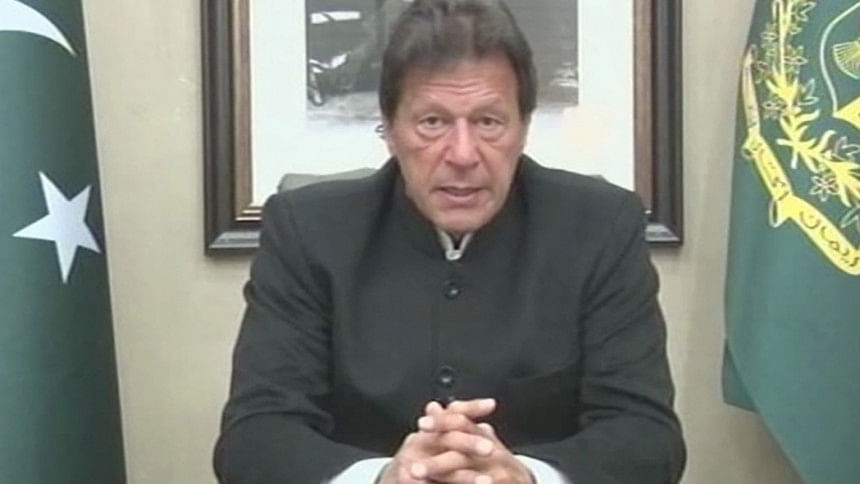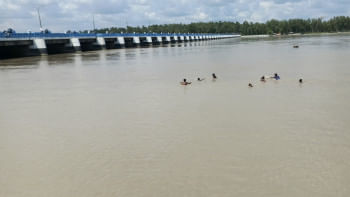Pak will retaliate if India attacks

Prime Minister Imran Khan yesterday said Pakistan would retaliate if attacked by India in response to a bombing in the disputed Kashmir region, which India blamed on Pakistan, while adding he wanted to cooperate in investigating the blast.
New Delhi sternly rebuffed Khan's investigation offer and accused Islamabad of misleading the international community.
Tension between the nuclear-armed neighbours has risen sharply over the killing in the Indian-controlled part of Kashmir on Thursday of 40 Indian paramilitary police in a suicide bomb attack claimed by the Pakistan-based Jaish-e-Mohammad (JeM) militant group.
Pakistan has denied any involvement and called for UN intervention.
But Indian Prime Minister Narendra Modi, facing a general election by May, has come under pressure to exact revenge, and has said he has given his security forces a free hand to administer a "strong response".
In a televised address to the nation, Khan noted the calls in India for revenge and said he hoped "better sense will prevail".
"If you think that you will launch any kind of attack on Pakistan, Pakistan will not just think about retaliation, Pakistan will retaliate," Khan said.
"And after that where will it head?"
The South Asian neighbours have fought three wars since 1947, two of them over Kashmir.
While they have not fought a full-scale war since they both tested nuclear weapons in 1998, they have fought countless skirmishes along their de facto border in the mountains of Kashmir.
Khan reiterated that Pakistan had nothing to do with the bomb attack and said it was ready to take action against anyone found to be behind it.
"If you have any actionable intelligence that Pakistanis are involved, give that to us, I guarantee you that we will take action," Khan said.
India's Foreign Ministry spurned the offer, saying Islamabad had failed to act on proof given to it about previous attacks.
"The prime minister of Pakistan has offered to investigate the matter if India provides proof. This is a lame excuse," said the ministry statement.
"We demand Pakistan to stop misleading the international community and take credible and visible action against the perpetrators of Pulwama terrorist attack," it added.
Pakistan's military has a long record of nurturing militants as proxies in pursuit of foreign-policy objectives, and India has for years accused it of supporting separatist militants fighting a nearly 30-year revolt in its only Muslim-majority state.
Muslim Pakistan has long said it only provides moral and diplomatic support to the Kashmiri people in their struggle for self-determination, though that has never dispelled India's conviction of Pakistani support for militants.
Khan said his country had changed.
"I am telling you clearly that this is new Pakistan. This is a new mind set, this is new thinking," Khan said. "We want stability," he added.
'SURRENDER OR BE KILLED'
Indian security forces intensified a crackdown in response to the deadliest attack on security forces in three decades of insurgency in the Muslim-majority region.
Lieutenant-General KJS Dhillon, India's top military commander in Kashmir, accused Pakistan's main Inter-Services Intelligence (ISI) spy agency of "controlling" those behind the Thursday bombing and warned of retribution.
"I would request all the mothers in Kashmir to please request their sons who have joined terrorism to surrender and get back to the mainstream," Dhillon told reporters in Srinagar.
"Otherwise anyone who has picked up the gun will be killed."
The bomb attack was carried out by a 20-year-old man from a village in Indian Kashmir. His parents said had joined a militant group after being beaten by Indian troops three years ago.
The bomb attack has sparked outrage in India with calls for revenge circulating on social media, and rising animosity towards Kashmiri Muslims in other parts of the Hindu-majority country, to the alarm of rights groups.
Pakistan was also accused by Iran last week of sheltering the perpetrators of an attack which killed 27 Revolutionary Guards, while Kabul and Washington have long claimed that Islamabad offers safe haven to the Afghan Taliban.
'SENSE OF URGENCY'
Earlier yesterday, Pakistan appealed to the United Nations to intervene, in light of deteriorating security.
"Attributing it to Pakistan even before investigations is absurd," Pakistan's Foreign Minister Shah Mahmood Qureshi said in a letter to the UN Secretary General Antonio Guterres seeking UN involvement to lower tension.
"It is with a sense of urgency that I draw your attention to the deteriorating security situation in our region resulting from the threat of use of force against Pakistan by India," he said.
The United States had told India it supported its right to defend itself against cross-border attacks, India said.
Pakistan's close ally China urged it and India to ease tension through talks.
"China hopes that Pakistan and India can exercise restraint and hold dialogue, to achieve a 'soft landing' as soon as possible," said China's foreign ministry spokesman.
Jammu and Kashmir, a former princely state on the border between India and Pakistan, has been in dispute since the partition of India in 1947. Control is split between the two countries but each claims the region in full.

 For all latest news, follow The Daily Star's Google News channel.
For all latest news, follow The Daily Star's Google News channel. 



Comments